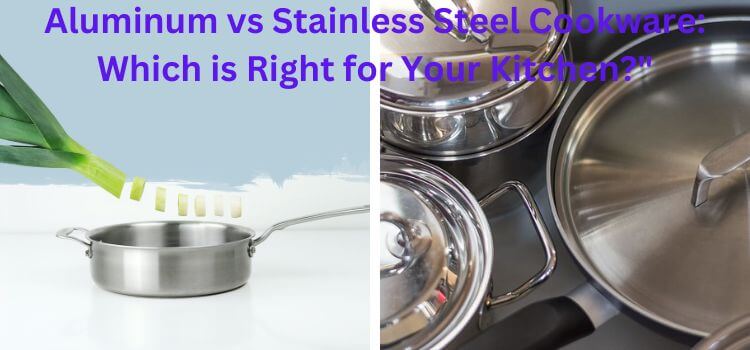As an Amazon Associate, I earn from qualifying purchase.
Cookware is vital in any kitchen; choosing the appropriate kind can make or break your cooking experience. Regarding cookware materials, aluminium and stainless steel are two of the most popular options. This article will explore the differences on the Aluminum vs Stainless Steel Cookware and help you determine which is best for your kitchen.
Introduction:
Cookware is an essential component of any kitchen, but with so many options, it can be challenging to know which type to choose. Two popular materials for cookware are aluminium and stainless steel, each with unique advantages and disadvantages.
Aluminium is lightweight and heats up quickly, while stainless steel is durable and non-reactive. In this article, we’ll compare among the Aluminum vs Stainless Steel cookware to help you determine the right type for your kitchen.
Aluminum Cookware
Aluminum is a lightweight and highly conductive material that heats quickly and evenly. It’s often used for cookware bases or as the core of multi-layered cookware.
T-fal Fresh Recycled Aluminum Ceramic Nonstick Cookware Set 12 Piece Pots and Pans, Dishwasher Safe Grey

Stainless Steel Cookware
Stainless steel is a long-lasting, non-reactive material recognized for its resistance to rust and corrosion. It’s frequently utilized on the exteriors of cookware or as the outer layers of multi-layered cookware.
Cuisinart 14-Piece Cookware Set, Chef’s Classic Stainless Steel Collection, 77-14N

Comparison: Aluminum vs Stainless Steel Cookware
Heat Distribution
Aluminium cookware transmits heat rapidly and evenly, making it perfect for foods requiring steady heat. However, aluminium and stainless steel do not retain heat, leading to uneven cooking if the heat source is improperly maintained.
Stainless steel cookware is slower to heat up and distribute heat evenly but retains heat well, making it ideal for dishes that require longer cooking times or for keeping food warm after cooking.
Heat Retention
Aluminium cookware does not retain heat, as well as stainless steel, which can be a disadvantage when it comes to keeping food warm after cooking.
Stainless steel cookware retains heat well, making it ideal for keeping food warm or simmering dishes over a more extended period.
Durability
Aluminium cookware is generally less durable than stainless steel and is prone to warping, denting, and scratching. However, high-quality aluminium cookware can still last for years with proper care and maintenance.
Stainless steel cookware is exceptionally long-lasting and resistant to rust, corrosion, and scratches. It can last for many years with proper care and maintenance.
Reactivity
Aluminium cookware can react with acidic foods, such as tomatoes or citrus, which can cause the food to take on a metallic taste.
Stainless steel cookware is non-reactive and won’t alter the taste of your food.
Maintenance
Aluminium cookware can be cleaned with mild soap and warm water. However, it’s important to avoid using abrasive materials, which can scratch or damage the surface.
Stainless steel cookware can be cleaned with mild soap or in the dishwasher. However, it’s important to avoid using abrasive materials, which can scratch or damage the surface.
Price
Aluminium cookware is generally less expensive than stainless steel, making it a more budget-friendly option.
Stainless steel cookware is generally more expensive than aluminium, but its durability and longevity make it a worthwhile investment.
Cooking Methods of Aluminum vs Stainless Steel Cookware
Aluminium cookware is ideal for dishes that require consistent heat, such as sautéing, frying, or boiling. It’s also great for baking, as it distributes heat evenly.
Stainless steel cookware is ideal for dishes requiring longer cooking times or keeping food warm, such as simmering or slow cooking. It’s also great for searing or browning meat, as it retains heat well.
Aluminum Cookware Pros and cons
Pros
Cons
Stainless Steel Cookware Pros and cons
Pros
Cons
Which is the Best among Aluminum vs Stainless Steel Cookware for Your Kitchen?
The choice between aluminium and stainless steel cookware ultimately comes down to personal preference and cooking needs. Aluminium may be the way to go if you’re looking for lightweight, budget-friendly cookware that heats up quickly and evenly. Stainless steel may be the better choice if you’re looking for durable, long-lasting cookware that retains heat well and won’t react with acidic foods.
Recommended Brands
Some top aluminium and stainless steel cookware brands include All-Clad, Calphalon, Cuisinart, and T-fal.
Where to Buy
Cookware can be purchased from a variety of retailers both online and in-store. Recommended retailers with aluminium and stainless steel cookware include Amazon, Bed Bath & Beyond, Williams Sonoma, and Sur La Table.
Final words
When choosing between aluminium and stainless steel cookware, it’s essential to consider factors such as heat distribution, heat retention, durability, reactivity, maintenance, price, and cooking methods.
Both aluminium and stainless steel cookware have distinct advantages and disadvantages, making them appropriate for various cooking styles and budgets
FAQ for Aluminum vs Stainless Steel Cookware
Yes, aluminium cookware is generally safe to use.
Yes, most stainless steel cookware is dishwasher safe. However, checking the manufacturer’s instructions before putting any cookware in the dishwasher is essential.
Not all aluminium cookware is compatible with induction cooktops. It must have a magnetic base to use aluminium cookware on an induction cooktop.
Stainless steel cookware can be cleaned with mild soap and warm water or in the dishwasher. It’s important to avoid using abrasive materials, as they can scratch or damage the surface.
Most stainless steel cookware can be used in the oven. However, it’s essential to check the manufacturer’s instructions before using any cookware in the oven.
steel cookware is durable and can withstand metal utensils. However, it’s important to avoid using sharp or abrasive utensils, which can scratch or damage the surface.
To remove stains from aluminium cookware, mix equal parts water and white vinegar and bring the mixture to a boil in the cookware. Allow the mixture to cool, then wash the cookware with mild soap and warm water.

Leave a Reply